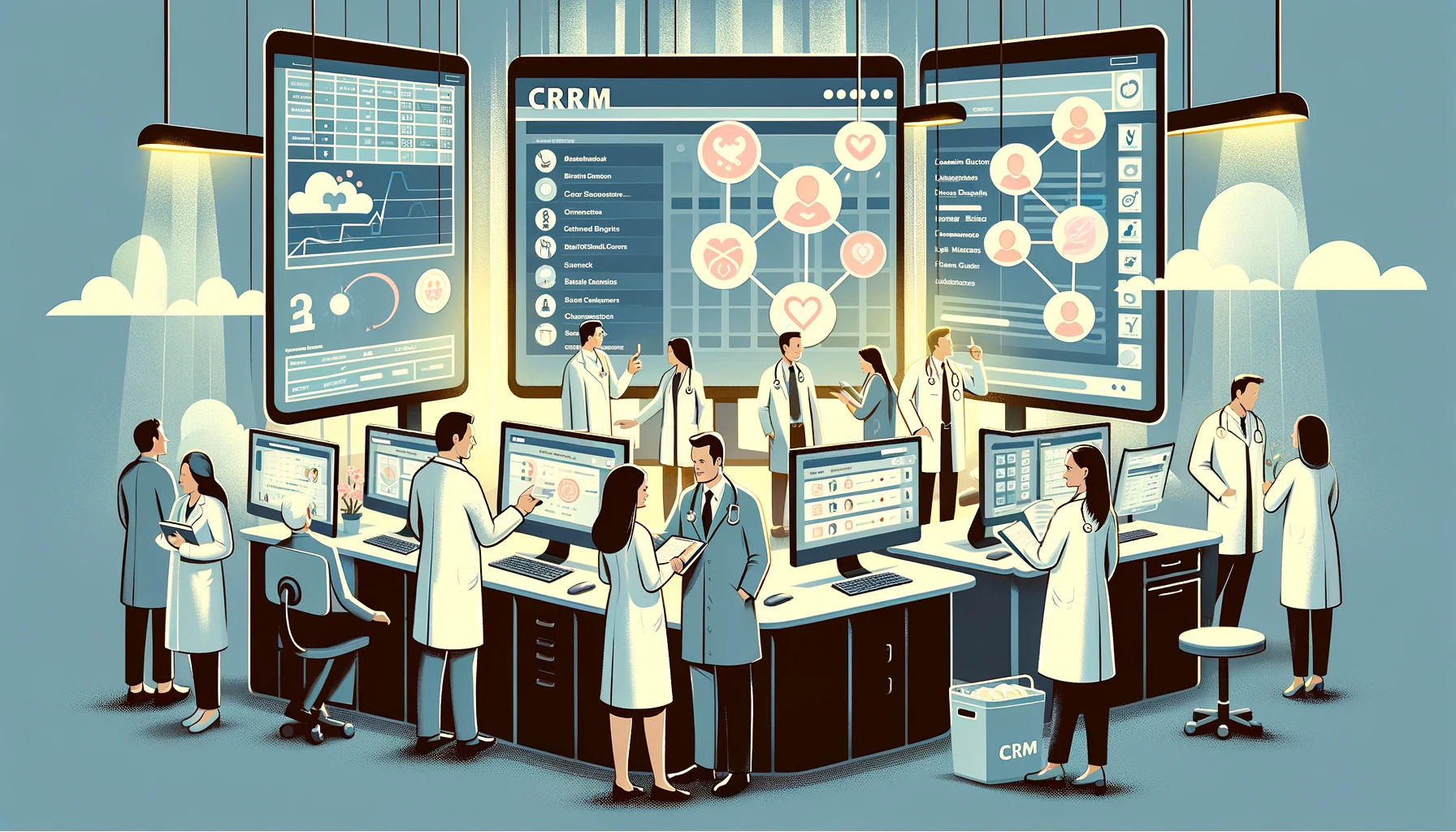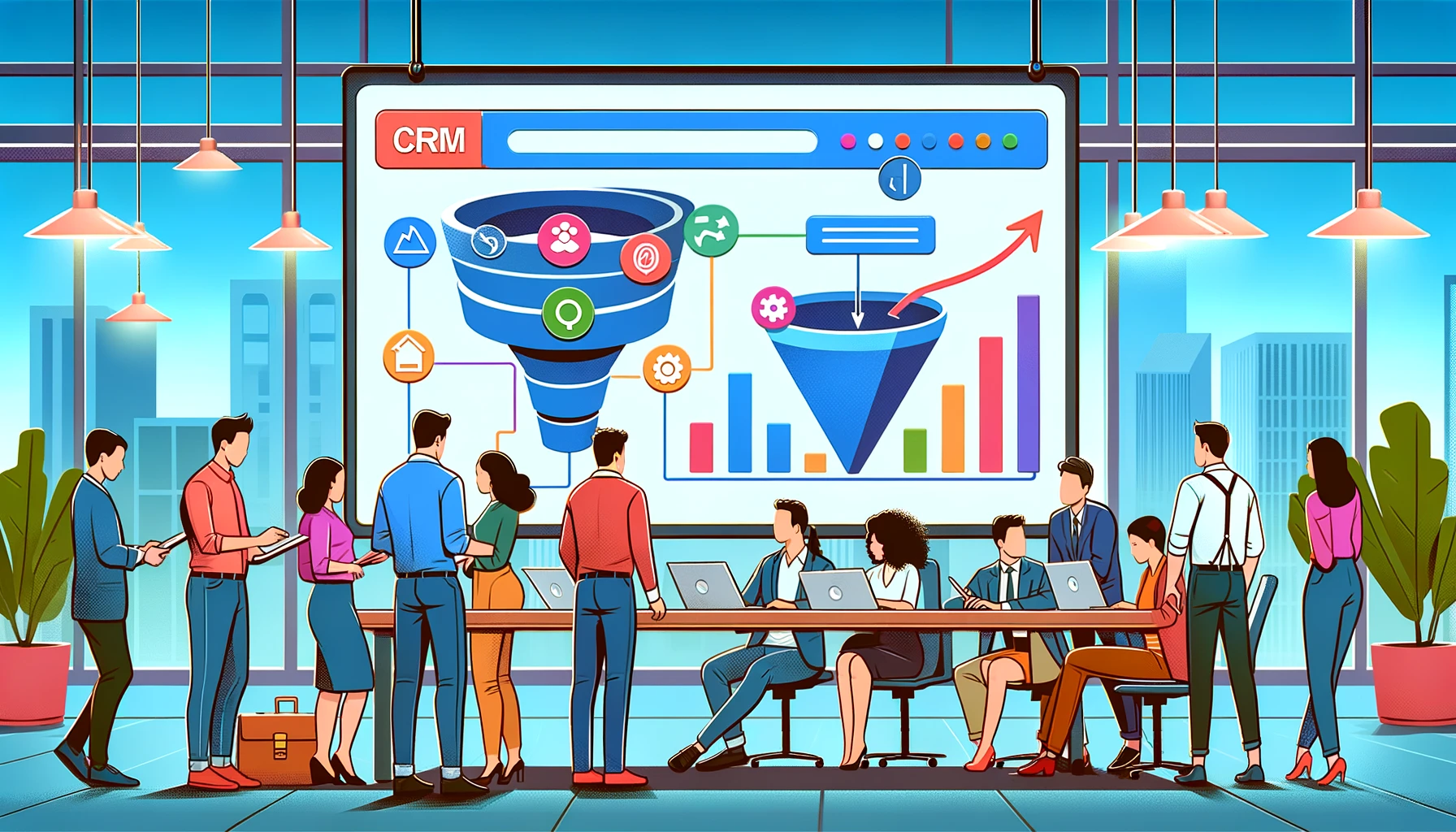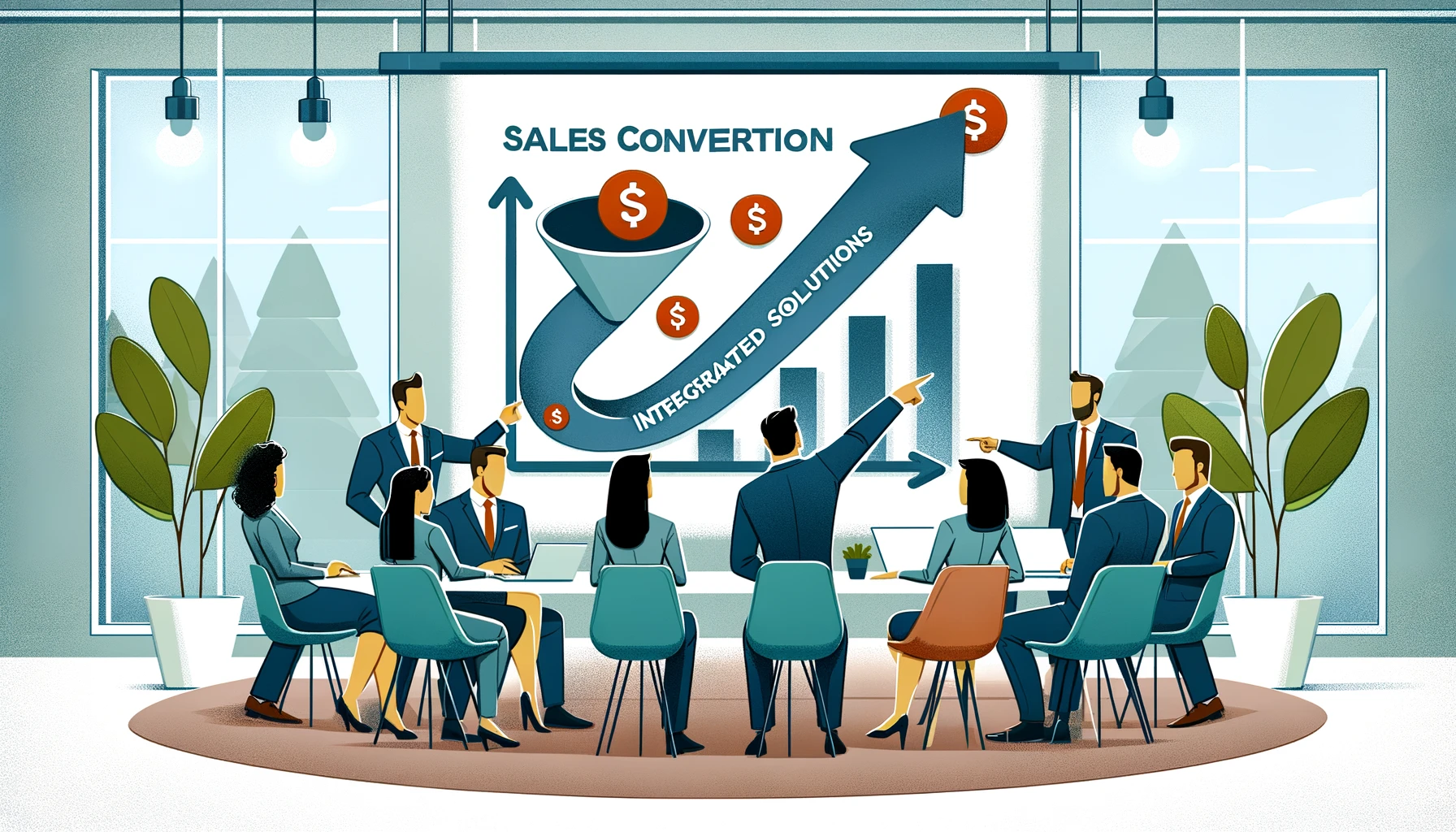Integrated Business Solutions 2024: Growth Unleashed

Unlock the full potential of your business with our integrated solutions. Advanced technology and expert support for all your business needs.
Exploring Integrated Business Solutions: The CRM Advantage
In a world where data is king, the ability to streamline and harness the power of information is paramount. Integrated business solutions, particularly CRM software, provide the tools to do just that. By consolidating data from various departments, these solutions create a holistic view of a company’s operations.
CRM, or Customer Relationship Management, is a powerful tool within the suite of integrated business solutions. It’s a game-changer for businesses of all sizes, providing insights into customer behaviors and preferences. This information can be used to enhance customer service, boost sales, and drive growth.
For instance, a company might use CRM to track customer interactions across multiple channels, from social media to email marketing. This data can then reveal patterns and trends, helping the company to optimize its marketing strategies.

Moreover, CRM software often comes with features for automation and task management. These can help to streamline workflows, freeing up time for employees to focus on more strategic tasks. Here are a few ways this can impact a business:
- Improved Efficiency: By automating routine and daily tasks, employees can focus on more complex issues, boosting productivity.
- Enhanced Customer Service: With access to comprehensive customer profiles, customer service reps can provide more personalized service to every client.
- Increased Revenue: By identifying patterns in customer behavior, companies can tailor their offerings to meet customer needs, driving sales.
Given these benefits, it’s no surprise that companies are increasingly turning to CRM as part of their integrated business solutions. They recognize the value in having a centralized system for managing customer relationships, and the impact this can have on their bottom line.

Yet, while CRM offers numerous benefits, it’s crucial to remember that it’s just one piece of the puzzle. To truly harness the power of data, companies need a suite of integrated business solutions that work together to provide a comprehensive view of their operations. Let’s dive right where real magic happens.
| Metric | Before CRM Implementation | After CRM Implementation | Improvement |
|---|---|---|---|
| Customer Satisfaction Score (out of 10) | 7 |
9 |
+28.6% |
| Sales Growth (%) | 10 |
20 |
+100% |
| Efficiency Increase (%) | 0 |
30 |
+30% |
How CRM Software Elevates Your Business
Embracing a CRM system as part of your integrated business solutions can significantly elevate your business operations by offering a single, comprehensive view of each customer. CRM software allows companies to customize their interactions based on past behavior of their customers. This level of personalization improves customer satisfaction, which in turn boosts brand loyalty and increases sales.

Consider the following benefits:
- Enhanced Customer Understanding: By integrating a CRM system, businesses gain a comprehensive view of each customer. This centralized information allows for personalized interactions based on past behaviors, enhancing customer experiences.
- Boosted Sales through Personalization: Detailed insights from CRM software enable companies to tailor interactions for each customer. This approach improves satisfaction, fosters brand loyalty, and can lead to increased sales.
- Streamlined Operational Efficiency: Adopting a CRM system streamlines business operations. Automating routine tasks allows teams to focus on strategic activities, improving efficiency and productivity.
The power of CRM software as part of integrated business solutions is not just theoretical. For instance, one of our clients, a mid-sized retail company, saw their customer satisfaction score rise from 7 to 9 after implementing a CRM system. Furthermore, their sales growth doubled, from 10% to 20%, demonstrating the tangible benefits of CRM software.

| Metric | Before CRM Implementation | After CRM Implementation | Improvement |
|---|---|---|---|
| Customer Satisfaction Score (out of 10) | 7 |
9 |
+28.6% |
| Sales Growth (%) | 10 |
20 |
+100% |
In the realm of integrated business solutions, CRM software is a key player, offering businesses the tools to understand their customers better and serve them more effectively. The result is a win-win situation, with businesses enjoying increased sales and customers benefiting from a more personalized service.
Get Started with Integrated Business Solutions
Embracing integrated business solutions can be a transformative journey for your business. The first step is understanding your needs. Every enterprise is unique, with its own particular set of challenges and goals. Therefore, the choice of software must align with these unique requirements. Whether it is improving customer relationships, streamlining operations, or boosting sales, the right CRM system can bring about a significant positive change.

Here are a few considerations that can guide your decision-making process:
- Identify your needs: Understand your business processes and identify areas where automation can improve efficiency and productivity.
- Consider scalability: As your business grows, your software should be capable of accommodating this growth.
- Evaluate user-friendliness: A system that is easy to use encourages adoption across the organization.
- Check for integration capabilities: The CRM software should seamlessly integrate with your existing systems to provide a unified view of operations.
Ultimately, implementing integrated business solutions is not just about adopting new technology. It’s about transforming your business to be more customer-centric, efficient, and agile. It’s about enabling your teams with the right tools to excel in their roles. And most importantly, it’s about ensuring your business is equipped to thrive in the digital age.
So, are you ready to unleash the full potential of your business with integrated business solutions? The journey begins now.
Real-Life Success Stories Using CRM Software
Every business has a unique story to tell when it comes to their journey with integrated business solutions. Here, we delve into a few remarkable transformations that CRM software has brought about.
First example is a thriving e-commerce store, struggled with managing customer interactions. They had a growing customer base, but their existing systems were not adept at handling the volume of data. The implementation of CRM software as part of their integrated business solutions completely changed the scenario. They were able to manage customer interactions efficiently, leading to improved customer satisfaction and increased sales.

| Metric | Before CRM Implementation | After CRM Implementation | Improvement |
|---|---|---|---|
| Customer Satisfaction Score (out of 10) | 6 |
9 |
+50% |
| Sales Growth (%) | 15 |
25 |
+66.7% |
Another instance involves a healthcare provider who was dealing with a fragmented view of patient information. The adoption of a CRM system allowed them to have a unified view of each patient’s history, leading to better patient care and higher patient retention rates.

| Metric | Before CRM Implementation | After CRM Implementation | Improvement |
|---|---|---|---|
| Patient Retention Rate (%) | 70 |
85 |
+21.4% |
In another case, a startup was having difficulty tracking their sales pipeline. With the integration of a CRM tool, they were able to visualize their sales funnel, identify bottlenecks, and optimize their sales processes. This led to a significant increase in their conversion rates.

| Metric | Before CRM Implementation | After CRM Implementation | Improvement |
|---|---|---|---|
| Conversion Rate (%) | 20 |
30 |
+50% |
These are just a few examples of how integrated business solutions with CRM software can revolutionize business operations. The key to success lies in understanding your unique needs and choosing a solution that aligns with them.
Simplifying Business Processes with Integrated Solutions
In the contemporary business environment, simplifying complex processes is the key to efficiency and productivity. Integrated business solutions play a significant role in this aspect, especially in managing and streamlining business processes. By connecting different facets of a business, these solutions bring smooth coordination, better communication, and improved decision-making.
Take, for instance, the sales process. It involves numerous steps - from lead generation to closing the sale. By leveraging integrated business solutions, a company can automate and optimize this process. This leads to a shorter sales cycle, improved conversion rates, and ultimately, increased revenue.

Here’s how the sales process can be simplified using integrated business solutions:
- Automated Lead Generation: Instead of manually scouting for potential customers, companies can use software to automate this process. This saves time and ensures that no potential lead is missed.
- Streamlined Sales Funnel: With a clear view of the sales funnel, companies can identify bottlenecks and optimize their strategies accordingly.
- Efficient Follow-ups: Integrated solutions can automate follow-up emails or calls, ensuring that potential customers are not neglected.
One of our clients, a B2B service provider, was struggling with their sales process. After implementing integrated business solutions, they were able to streamline their process, leading to a 30% increase in their conversion rate.

| Metric | Before Implementation | After Implementation | Improvement |
|---|---|---|---|
| Conversion Rate (%) | 20 |
30 |
+50% |
In essence, integrated business solutions simplify business processes, making them more efficient and effective. They eliminate redundancies, reduce errors, and save time, thereby enhancing productivity and driving business growth. Whether you’re a small business or a large corporation, these solutions can transform the way you operate, setting you on the path to success.
FAQs
-
What Are Integrated Business Solutions? Integrated business solutions refer to a suite of software and services designed to streamline various business processes. These solutions integrate different functional areas like finance, HR, sales, and operations into a cohesive system, enhancing efficiency and communication.
-
How Do Integrated Business Solutions Improve Efficiency? By integrating disparate business processes and systems, these solutions reduce manual data entry, minimize errors, and facilitate quicker decision-making. This leads to a more efficient workflow and better resource management.
-
Can Integrated Business Solutions Be Customized for Specific Industries? Yes, most integrated business solutions are highly customizable. They can be tailored to meet the unique needs and challenges of various industries, ensuring that the specific requirements of each business are met.
-
What Is the Role of Data Analytics in Integrated Business Solutions? Data analytics in integrated business solutions plays a crucial role in providing insights into business performance. It helps in identifying trends, forecasting future scenarios, and making data-driven decisions, thereby contributing to strategic planning and growth.
-
Are Integrated Business Solutions Suitable for Small Businesses? Absolutely. Integrated business solutions are scalable and can be designed to fit the needs and budget of small businesses. They provide a foundation for growth, allowing small businesses to efficiently manage operations and compete in the marketplace.
Read more about low-code platform ozma.io
CRM for Beginners: Easy to Start!
CRM for Photographers: More Clients and Efficiency





